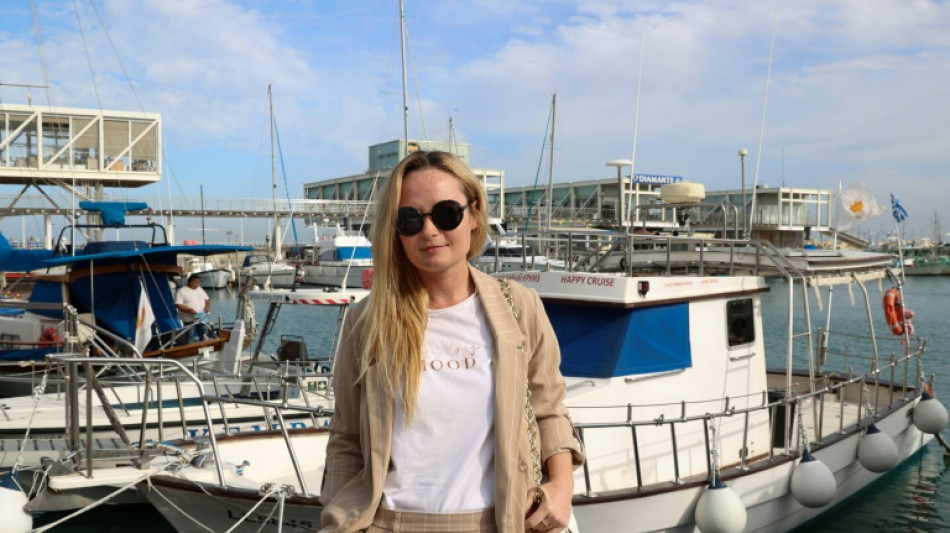

Ukrainians in 'Moscow on the Med' look on in horror
Ukrainians living alongside fellow expats from "brother" Russia in the Mediterranean seaside town of Limassol in Cyprus looked on in horror Thursday at the Russian assault on their homeland.
"This is the worst-case scenario we could have imagined. They are bombing all regions of Ukraine, attacking all our airports and bases," said Evgeny Staroselskiy, a director of Russian Radio Cyprus based in Limassol.
He said nationals from both countries had awoken in shock to hear of the full-blown conflict unfolding between Ukraine and its giant neighbour.
"A lot of people have family on both sides of the border," said the 60-year-old native of Kharkiv, a mainly Russian-speaking city in eastern Ukraine considered in the "red zone" because of its proximity to the border with Russia.
But Staroselskiy stressed the influence of Russian media on the attitude of citizens from their side, even in sunny Limassol, also known as "Limassolgrad" or "Moscow on the Med" as being home to tens of thousands of people from ex-Soviet republics as well as a favourite holiday destination.
"We are all brothers but we are now receiving telephone calls from some Russians who actually support this crazy (Russian President Vladimir) Putin. We are very surprised."
A group of Russian bikers, clad in leather waistcoats with Moscow and Saint Petersburg emblazoned on the back, gathered at Limassol's gleaming marina tried to play things down.
"This is all bullshit; it's all politics," said Grigori, declining to give a surname. "We are family."
Ksenia Bordianou, a 36-year-old Ukrainian yacht stewardess whose mother's family hails from Siberia, said she used to celebrate the Soviet Union's February 23 "Defender of the Fatherland Day" holiday until Russia's 2008 war in Georgia, a harbinger of its 2014 annexation of Crimea, seized from Ukraine.
"Talking to Russians, Crimea is the one issue we've never been able to agree on," she said of the peninsula located some 1,000 kilometres (600 miles) due north of Cyprus.
For many ordinary Ukrainians, said Oksana, a mother from Kherson, a Russian-speaking city close to the Crimean Peninsula, "the biggest immediate concern" was rising food and utility prices as well as access to the banking system.
- Fallout fears -
As for Cyprus, whose economy is heavily dependent on tourism revenues, to which Russia and Ukraine are both major contributors, it fears the fallout from the crisis and the mounting sanctions being slapped on Moscow.
More than 780,000 Russian tourists visited Cyprus in 2019 before Covid struck, out of a total of some 3.9 million, making it the holiday island's second largest market after Britain. Over 95,000 Ukrainian arrivals were registered in the same year.
Cyprus, an EU but non-NATO member, has since counted on tourists from both Russia and Ukraine for a revival.
Ethnically divided, Cyprus is a close friend of Russia, but Nicosia has defended Ukraine's independence as the only EU country with occupation troops on its soil.
In response to Russia's attack on Ukraine, Cypriot President Nicos Anastasiades, himself a native of Limassol, on Thursday condemned "any actions which violate the sovereignty and territorial integrity of an independent country".
The eastern Mediterranean island has been split since 1974 when Turkish forces occupied its northern third in response to a military coup sponsored by the junta in power in Greece at the time.
Russian Radio's CEO, Stanislav Andonov, a 58-year-old from Moscow, said relations on the island between Ukrainians and Russians had at least until Thursday been unaffected by the drums of war.
"I have not felt any friction and doubt there will be any," he said.
Andonov said the "Defender of the Fatherland Day", as previously celebrated across the Soviet Union to mark the 1918 foundation of the Red Army, was treated by Russian-speaking expats simply as a "men's day", equivalent to the March 8 International Women's Day.
Staroselskiy's wife, Yuliya, a DJ at Russian Radio, pointed out that many of the Russians living in Cyprus were "not supporters of Putin in any case", lowering a source of tension with their Ukrainian fellow expats.
E.Mancini--IM



